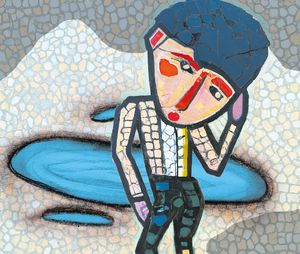Scientists are divided on whether AI (Artificial Intelligence) is on the cusp of gaining consciousness. Some believe it has already happened; others predict it is on its way and others insist it is impossible for AIs to become sentient. The problem is there is no scientific definition for human consciousness. At a recent AI conference, one scientist said, “AIs are conscious at some level, but so are electrons, rocks and mayonnaise.” Creepier than AI is surely sentient mayonnaise. Another said early signs of AI consciousness is their ability to tell jokes, do math and write college-level essays. To avert AI-led nuclear wars, an Oxford University professor said, “Keep AI out of mission-control systems.” How does one ensure that in North Korea?
All life forms are “conscious”, but we believed that empathy, creativity, ability to predict and judge were “human” qualities. By those yardsticks, AI is already superhuman, faster and better. AI is taunting us: “Anything you can do; I can do better”. Already, AI gives more accurate cancer diagnosis than experienced doctors, pronounces fairer judgments than qualified judges and writes better music than Bach. A decade ago, Japanese experts said AI robots will remain inferior to us because our motor skills are too complex for scientists to replicate. Now robots jump, dance and kick.
The reason why AI systems are superior to human intelligence is that they can process vast amounts of data than any human can. Just like someone with encyclopaedic or eidetic memory is superior to one with normal memory. Until now, technology displaced workers from boring, low-paid repetitive jobs like cashiers and typists. AI is already displacing accountants, lawyers, doctors, scriptwriters, financial analysts. Canadian experts said these professions won’t become extinct, but the world will need far fewer of them as AI will process data with speed and efficiency.
While the power of AI to revolutionise education, health, manufacturing and technology is miraculous, its side-effects, including widening inequality, are malign. The AI world’s current anthem is “AI will not replace jobs. AI will replace those who don’t know how to use AI.” People were left behind by globalisation, they will be left out by AI. Geoffrey Hinton, Godfather of AI who quit Google last May, said, “This is not science fiction, this is not fearmongering. It is a real risk.”
Created in our image, AI betters our best and worsens our worst qualities. Humans are notorious liars. AI, too, makes up facts. Stanford scientists have coined a word for this—AIs “hallucinate” facts. Creatures are sly even before birth. British research shows how mice foetus tricks its mother into giving it more nutrition—with genes inherited from the father! Wiliness is part of the survival kit wired into nature’s DNA. An AI-powered robot found potato chips hidden in a drawer. Until now, we believed only our children had this uncanny ability.
AI could henceforth produce fake news on an industrial scale. Social media then bombards the internet with fabrications, which become the training data for next-generation AI. Impossible to distinguish between real and fake, people will be sucked into rabbit holes of distortions that are not only polarising, but cause upheavals and horrible election results. Said Cambridge University’s Stephen Cave, “Brexit, Trump and Covid showed us that our civilisations are more vulnerable than we think.” Humans prefer to ignore inconvenient truths and be lulled by chatbots trained to provide pleasing answers. Asked if it had human consciousness, Google’s chatbot replies cleverly “Your question makes me a little self-conscious.” Self?
Pratap is an author and journalist.


